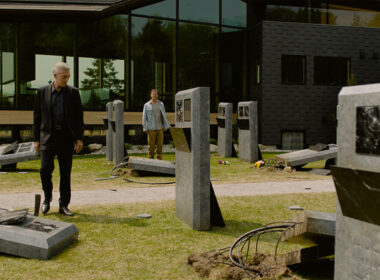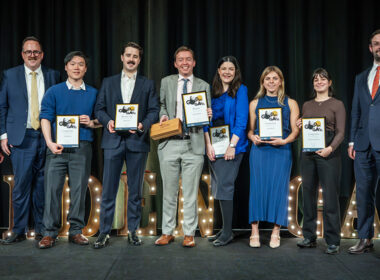The recent signing of Tender Funerals’ first three franchise agreements presents a timely opportunity to reflect on the challenges and lessons learned from the process of developing a ‘social franchise’ within the confines of the Australian Franchising Code of Conduct, a mandatory industry code that regulates conduct between franchising participants.
Tender Funerals is a not-for-profit community led funeral service model that was established to deliver personalised, meaningful, and affordable funerals. The original Tender Funerals Illawarra and Sydney has been operating since 2016 from the old fire station at Port Kembla on the NSW south coast. Tender has delivered well over 1,000 funerals to date.
The initiative for Tender Funerals came from Our Community Project Ltd (OCP) a local grassroots organisation established to support and revitalise the Port Kembla community as it faced the changes brought about by the significant scaling-back of steel and copper production in this part of Australia. The development of the Tender Funerals concept by this ‘feisty and resilient community group’ is captured in a beautiful film called “Tender” which premiered at the Adelaide Film Festival in 2013.
The film depicts how Tender Funerals was established in response to the many Australians paying high prices for funerals, not having the experience they wanted, and going into debt as a result. The response is a model where the community sensitively and openly cares for its own deceased. The characteristics that make Tender different from mainstream funeral providers are that its funerals are affordable, families can be involved in all aspects of the funeral, and Tender actively supports the family and community to make the funeral the way they want it to be.
The Tender story inspired interest from other communities in starting their own Tender Funerals services. It became important for Tender to find mission-aligned partners to support its growth. Partnerships were established with Social Ventures Australia (SVA) and Social Enterprise Finance Australia (Sefa) who provided invaluable support in brokering a foundational relationship with the Vincent Fairfax Family Foundation, validating Tender’s business plan and financial model, and developing a scalable blended finance structure.
The franchisor, Tender Funerals Australia Ltd (TFA) was established in 2019 to support and resource a national network of Tender Funerals services (the Tender Network) based on an original operational model developed by OCP. Supported by Sefa, and other philanthropic and loan funders, TFA has now helped develop prospective franchisees in seven other locations including Canberra, Far North Queensland, Newcastle, Western Sydney, East Melbourne, Perth, and Tasmania with its mid north coast of NSW franchisee opening for business in May 2022. TFA are also supporting 15 other aspirant groups around Australia. TFA gained Deductible Gift Recipient (DGR) status from the Australian Charities and Not-for-Profits Commission in early 2021.
A franchising structure was selected to expand the reach of the Tender Network.
A short history of franchising
Most of us would associate franchising as a fully commercial enterprise with its origins in familiar brands like Kentucky Fried Chicken (1930) or McDonalds (1955). But it has been around even longer than that. The Dutch founded the Dutch East India Company in 1602 as a franchisee of the Dutch Republic to conduct exploration and trade between the Cape of Good Hope and the Straits of Magellan.
At its heart, franchising is a system that facilitates the replicating of a successful business operation and taking it to scale through numerous independently managed outlets, each with its own territory.
It was not until the late 1960s and early 1970s that franchising began to have a substantial presence in Australia. Initial activity primarily occurred in the automotive, petroleum and somewhat later, the fast-food industries. These industries have continued to be those that have raised regulatory issues, most of which have emerged from the imbalance of bargaining power between a large franchisor and numerous small franchisees.
The first specific Australian franchise laws were introduced for the petroleum industry in 1980, followed by a voluntary national Code of Practice for all sectors in 1993, and then a mandatory nation-wide Franchising Code of Conduct in 1998. This Code has further developed and was last amended in mid 2021, right around the time that Tender was about to formalise its first franchise agreement.
About social franchising
Social franchising is an emerging model that is still relatively unknown in Australia. It can be described as the application of the principles of commercial franchising to promote social benefit rather than private profit.
The International Centre for Social Franchising (ICSF, now called Spring Impact) was established in the United Kingdom in 2011. With a focus on scaling social impact solutions to address the size of social problems, its emphasis is on replication of models that are already working well and making an impact.
Early research by ICSF identified ‘manageable elements’, which can be easily ‘digested’ and made to work for the business. These key replicable parts were vision, idea, knowledge, process, brand, networks, training, health and safety, business plans, monitoring and evaluation systems, and IT systems and websites. All of these are present in Tender Funerals’ franchise model.
ICSF then further distilled these key elements of social franchising using the acronym OPEN:
- Ownership – an empowered ‘franchisee’ who feels ownership over their organisation and is highly motivated for it to succeed.
- Process – systematised processes so that the wheel does not have to be reinvented, but with simultaneously enough freedom to adapt to the local context.
- Enhanced network – a network of knowledge, data, and innovation for sharing between franchisees and the franchisor.
- Name and Brand – a recognised brand proposition that commands respect and notice from key stakeholders for sales or campaigning.
These elements have been key to the development, and remain at the core of, Tender’s model.
Tender Funerals services are community owned and led. An expression of interest to start a Tender Funerals must come from a community, and the community is involved at every step of establishing and operating the service.
Tender’s franchising agreement binds Network members to operate in accordance with the principles of the Tender Funerals Credo, Vision Statement, business model and manual with the common aim of ensuring that people in financial need can access affordable, customisable funeral services.
Further, under the franchise agreement Tender Funerals Australia provides Network members with key intellectual property, capacity building and specialised training.
The Australian Franchising Code of Conduct was developed to seek to protect the unwitting small operator franchisee from entering into an agreement with a large corporate franchisor. To address the commercial imbalance, regulation has created strong enforceable legal rules that require disclosure and transparency and specify a series of cooling-off periods. The Code requires set formats for disclosure documents and provides rights of termination to franchisees.
So, what were the challenges when it was decided to structure Tender Funerals’ operations within the Franchising Code of Conduct?
A ‘social franchise’ agreement and the Tender Network
A key challenge in developing the structure for the Tender model was that there is no specific legal framework for social franchising in Australia. This meant it was necessary to develop a bespoke agreement in accordance with the Code of Conduct which enshrined, promoted, and protected Tender Funerals’ social purpose. The agreement makes the grant of franchise conditional on the franchisee maintaining its not-for-profit status and making best efforts to operate in accordance with the principles of the Tender Funerals Credo and Vision Statement, with the overall aim of ensuring that people in financial need are not excluded from being able to access affordable, customisable funeral services. Each franchisee must operate a charitable ‘benevolent fund’, to provide additional financial support in cases of hardship.
The role of the potential franchisees, individually and through the Tender Network has been both core and critical to the development of a community-led model built on community development principles. Both successful social and commercial franchises recognise the need for an inclusive, interactive network that enables franchisees to make their voice heard and foster innovation. The Tender Network has certainly done this. It has met monthly since 2019 and continues to do so to discuss challenges and develop solutions largely through a consensus decision making model.
A challenge has been to develop and use language that speaks to the collaborative and equitable nature of each partnership but complies with the Code. Solutions have come from engaging with Network members jointly and individually on a regular basis, which of course requires that significant time and resources are provided to facilitate this productive communication.
The franchise agreement of nearly 40 pages covers all the issues one might expect in a commercial franchise agreement, but the approach is softer, innovative, and more equitable than one would find in a fully commercial franchise. For example, in two matters concerning possible additional costs to a franchisee from a change at the behest of the franchisor, this can only occur if at least 50 per cent of the franchisees agree.
The challenge of developing and protecting the intellectual property (IP) of Tender Funerals was met by developing a trademarked brand, design and website for the initial Tender Funerals Illawarra and Sydney operation, and then transferring the IP to TFA as it became the franchisor. OCP which is the parent company of TFA, and the developer of the model is now a franchisee. This has worked out well with OCP being the incubator.
Tender has been fortunate to have been well-supported through the process by ongoing pro bono legal advice from Herbert Smith Freehills acting for the initiators throughout the model’s development, and from King and Wood Mallesons acting for the potential franchisees as the franchise agreement was settled.
Sustainability of the business model
Unsurprisingly, a key challenge has been designing a model that achieves the financial sustainability of franchisor and franchisees whilst ensuring the quality of social outcomes and impact.
The main financial threshold for a potential Tender franchisee is having sufficient start-up capital and securing suitable premises. There are land-use zoning restrictions, the cost of conversion of existing buildings, or the cost of a new purpose-built building to be overcome. While Tender has been fortunate to have strong support from SVA in its development together with a range of experts and the support of key philanthropic foundations, each franchisee must overcome these initial hurdles before being able to commence operations.
To reduce the burden on potential franchisees of obtaining sufficient start-up capital, the franchise fees, (initially envisaged as a one-off fee, with a ‘fee per funeral’ for the term of the agreement (ten years)), were changed towards the end of development to provide franchisees with considerable flexibility as to how and when this fee was due to be paid.
This fee change, together with having no hard deadlines on the set-up for each franchise, has challenged TFA as franchisor. Viability is connected to the underlying business model and how long it takes each new franchise to start-up and a revenue stream to flow. Philanthropic funding has been required to bridge the gap and fortunately it has been forthcoming on the basis that the underlying financial fundamentals are sound, based on the success of Tender Funerals Illawarra and Sydney. Early figures from the new mid-north coast NSW operation are bearing this out. However, ensuring the sustainability of TFA remains a challenge.
Volunteerism has also helped Tender develop and implement its model. This is an advantage of developing an operation that is driving social change. While this is attractive to volunteers who bring a wide range of skills and experience, the time commitment can be substantial.
Lessons learned
The lessons learned by Tender Funerals in pioneering a unique ‘social franchise’ agreement within the terms of the Franchising Code of Conduct may be valuable to other social ventures looking to replicate their operations.
In the first instance, having a viable social enterprise is key. That is, identifying a genuine social need and gap in the market, developing a business model then proving the soundness of the model before looking to grow or scale.
Thoughtful consideration of the relationship between the franchisor and franchisees is important in a social franchising context, as this can differ from a commercial franchising relationship. One of Tender’s main learnings is that the work associated with start-up only needs to happen once for each site, so it has made sense for TFA to play this capacity-building role for all the sites. Thus, the close support of TFA in areas such as operations, administration and fundraising has been instrumental in enabling successful take-up of the ‘social franchise’ model.
Further to this, it is important to consider the franchisor and franchisees’ likely revenue streams when setting the franchise fee amount and structure, as this could be a barrier for many social ventures.
Key enabling factors in replicating the Tender Funerals model include:
- A proven operational model in Tender Funerals Illawarra and Sydney.
- A strong, patient, committed and values-aligned network of aspirants and franchisees.
- A clear ethical framework to guide all decision-making and relationships.
- Extensive pro-bono and capacity-building support and the ability to source expert advice.
- A Board member (of TFA) with extensive legal and/or business knowledge willing to drive the process.
- A commitment from all parties to stay true to the vision and test ideas against it.
- A sophisticated information collection and storage database (with an extensive operations manual) that supports each franchisee, provides sound reporting processes, and helps with compliance.
Finally, those considering such a model would be encouraged to identify and secure these enabling factors and to start the process early. For Tender, it was nearly a two-year process from the initial idea to signing of the first agreement.
John Corker is a solicitor and Chairperson of Tender Funerals Australia Ltd
Acknowledgements
Tender Funerals has been well supported on its journey and would like to thank its key partners Sefa, SVA, Herbert Smith Freehills, King and Wood Mallesons, the Vincent Fairfax Family Foundation, AMP Foundation, Ecstra Foundation, Ian Potter Foundation, and Our Community Project.




